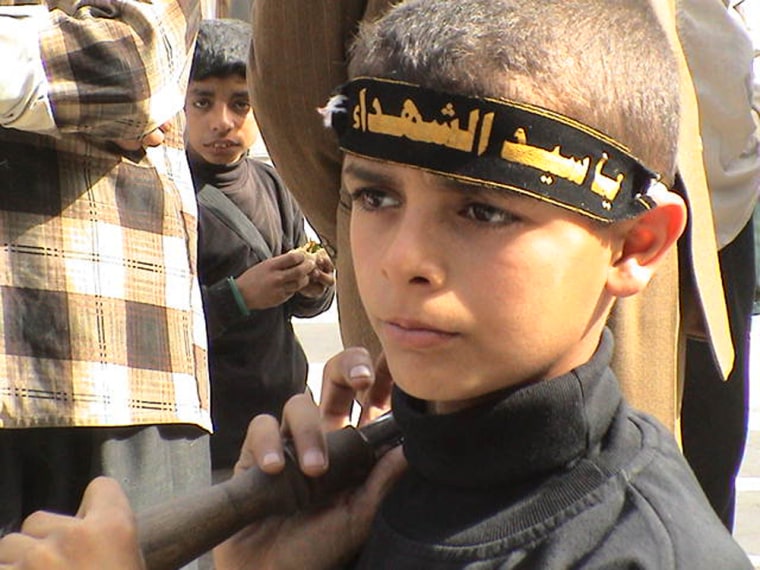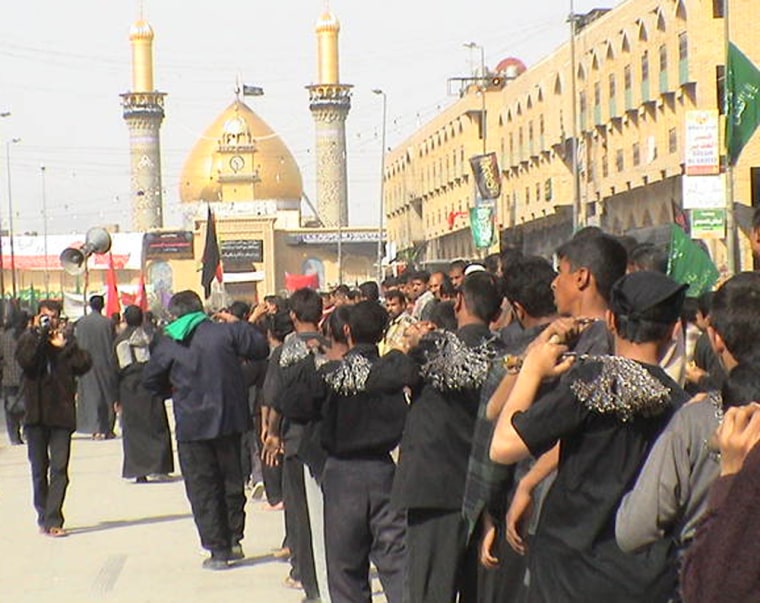Expressing religious freedom in a way banned under Saddam Hussein, nearly a million Shiites from around the world gathered in the streets of Karbala on Monday to lash their backs with chains and slice their foreheads with razor-sharp swords to express reverence for man who died more than 1,300 years ago in this city.
This 10-day religious festival of Ashura commemorates the martyrdom of Imam Hussein, the grandson of the prophet Muhammed, who led the ill-fated revolt against the ruling Sunni caliphates in the 7th century that resulted in the division of Islam between Sunni and Shiites for the last 1,300 years.
Under Saddam’s regime the Ashura pilgrimage was banned. But today, Jassim Mohammed Abbas was dressed in black from head to toe in funereal reverence.
He led a large group of men dressed the same way, toward Iman Hussein’s gold-domed shrine in the center of the city. The men carry colored flags; green for Islam, red for the blood of the martyr, white for purity.
“We are happy since we have been deprived from practicing this ceremony for 35 years," Abbas said. "The ex-regime people used to shoot us when we did this and their informers used to report against this activity. Now, thank God that [we] can practice our ceremony freely.”
Political expression
But there is more to Ashura than just the chanting, banging of goatskin drums, and self-flagellation.
It is the expression of spiritual devotion, yes; but beneath the religious fervor beats the undeniable rhythm of emerging Shiite political power -- something Saddam Hussein knew well. Its very practice was a remembrance of the revolt against Sunni leadership of Islam and became, under the regime, a secret but real defiance against his regime.
Through Ayatollah Ali al-Sistani, Shiites are already beginning to flex their political muscle by protesting in huge numbers for direct elections in Iraq before the end of the year; a notion that challenges a complex U.S. plan that included regional caucuses first, delaying elections until 2005. Some feel this is an effort to dilute the voting strength of Iraq’s Shiite majority.
But there’s also a concern that this emerging power could allow Shiite neighbor Iran to have a greater influence in Iraq. While pilgrims have come from around the world, organizers say the majority are from Iran.
Local moneychangers sift through large stacks of Iranian dinars bearing the face of Ayatollah Khomeini. Organizers also admit much of the funding, food, drink, and other supplies needed for the massive influx of people here come from Iran.
Wary of visitors
Iranian Mohsen Jaffari said he traveled 18 hours from Tehran to be here — but his motives are simple.
“The only reason I’m here,” he said, “ is to practice my religion and only my religion. I came here for Imam Hussein. It’s been my wish and desire for 35 years to make this pilgrimage here. All Iranians small and big dream of making this pilgrimage.”
But some Iraqis, even other Shiites, are cautious.

“They are welcome to come for spiritual reasons,” said Hatam Saban, “but that is all. If too many come in there could be problems.”
Security is tight with 10,000 police patrolling the streets of Karbala — searching bags and keeping out a wary eye for any potential violence. And with the many suicide bombings in post-war Iraq, cars are banned from the downtown area during Ashura.
Tuesday is the most significant day of Ashura and will likely see the greatest number of pilgrims.
But today the marches toward Hussein’s dome continue, some with boys as young as seven-years old, dressed as miniature versions of the men, all in black, swinging smaller, three or four strand versions of the zanjir chain whip across their tiny backs; too young to fully grasp the ritual’s meaning, but not too young to take their place within the Iraqi Shiite community.
